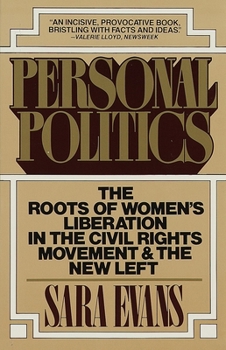Personal Politics: The Roots of Women's Liberation in the Civil Rights Movement & the New Left
Select Format
Select Condition 
Book Overview
The women most crucial to the feminist movement that emerged in the 1960's arrived at their commitment and consciousness in response to the unexpected and often shattering experience of having their work minimized, even disregarded, by the men they considered to be their colleagues and fellow crusaders in the civil rights and radical New Left movements. On the basis of years of research, interviews with dozens of the central figures, and her own personal experience, Evans explores how the political stance of these women was catalyzed and shaped by their sharp disillusionment at a time when their skills as political activists were newly and highly developed, enabling them to join forces to support their own cause.
Format:Paperback
Language:English
ISBN:0394742281
ISBN13:9780394742281
Release Date:January 1980
Publisher:Vintage
Length:274 Pages
Weight:0.60 lbs.
Dimensions:0.7" x 5.2" x 8.0"
Customer Reviews
1 rating
Connecting 1st & 2nd Wave Feminism: The Issue of Race
Published by Thriftbooks.com User , 20 years ago
I read this book as an assignment for an upper-division U.S. Women's History (from 1880-1980) course. Evans' narrative style is informative, personal, and engaging. Overall, the book is an easy-read. The thesis of Evans' book focuses on the way young white and black womens' work through SNCC (and other organizations)gave rise to the 2nd Wave Feminist movement of the 1960s. Ultimately, Evans is drawing on the parrallel between the Abolition movement and Suffrage movement to the early Civil Rights action and Women's Liberation movement. A century since it began, contemporary feminists (and others) seek to rectify the inherent racism of the earlier feminist movements. Evans' book, based on her personal experiences, discusses problems with racial tension in SNCC and its manifestation in the Women's Liberation movement. She especially explores how patriarchal social structures, fierce racial tension, and socio-economic differences pushed issues of racism within both the organized Civil Rights and Women's movements; more specifically, she describes the effects these factors had on women's accessibility to initiate change, women's self-perception, and women's relationships (cross and inter-cultural). Yet, she also speaks to the importance of the different female relationships formed during the early days of SNCC, cross-cultural relationships which blossomed outside of the deep South and led to stronger Civil Rights and Women's movements in other parts of the country. If one is unfamiliar with the many figures in the early SNCC and SCLC organizations, it would be helpful to have outside references so to identify the many figures Evans notes. Outside of this, the book is a great introduction to the social issues of the 1960s and the many structures of oppression feeding racism and sexism both then and today.






